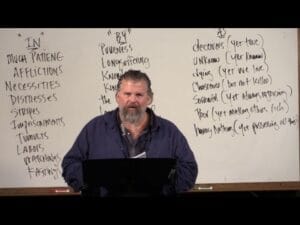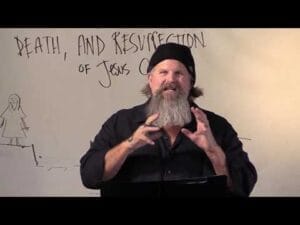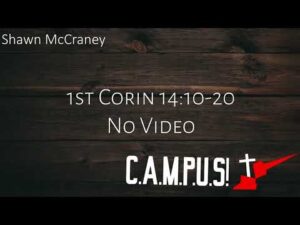
2 Corinthians 6:1-10 Part 1 Bible Teaching
Paul’s message in 2 Corinthians 6:1-10 highlights apostles as co-laborers with God, urging believers to embrace grace, maintain integrity, and endure hardships with patience and love.

Four Stances, Part 2
Shawn McCraney critiques traditional Christian doctrines, challenges views on Jesus’ return, emphasizes spiritual liberation, and advocates for equality and reinterpretation of scripture.

The Cross
Christianity prioritizes a personal relationship with God over deeds, akin to a cross’s vertical post. Believers should focus on God’s love, not politics or culture.

2 Corinthians 5:18-21 Bible Teaching
Paul and Shawn teach reconciliation through Christ, emphasizing renewal, righteousness, and spiritual growth. Apostles as ambassadors, believers as new creations, and God’s grace.

1 Corinthians 15 Part 3 Bible Teaching
Paul affirms Jesus’ resurrection ensures universal resurrection, with judgment based on deeds. Resurrection is rooted in scripture, promising eternal life for believers.

Four Stances, Part 1
Shawn McCraney critiques organized religion’s materialism and dogma, promotes self-initiated support, challenges apostolic succession, and advocates for a return to original teachings.


1 Corinthians 15 Part 2 Bible Teaching
The teaching highlights Christ’s resurrection as the core of the Gospel, witnessed by many, with Mary Magdalene as a key proclaimer, emphasizing grace and redemption.

2 Corinthians 5:17 Bible Teaching
Shawn’s teaching on 2 Corinthians 5:17 highlights spiritual rebirth in Christ, transforming believers into new creations with renewed hearts and minds, emphasizing faith and unity with Jesus.

Shut Up and Smile
Christianity focuses on love, viewing struggles as spiritual, not against others’ beliefs. It promotes love through prayer, faith, and service, avoiding ideological conflicts.

2 Corinthians 5:17 – End Bible Teaching
Shawn’s teaching on 2 Corinthians 5:14-15 emphasizes Christ’s death and resurrection, urging believers to live transformed lives in Christ, focusing on spiritual identity and eternal purpose.

1 Corinthians 15 Part 1 Bible Teaching
Paul’s teaching in 1 Corinthians 15 emphasizes the resurrection’s truth, addressing Greek skepticism, and outlines resurrection’s reality, nature, and benefits for believers.

An Evening with Reverend Brian Diggs
Shawn McCraney contrasts subjective faith with objective religion, advocating personal worship. Reverend Brian Diggs supports objective religion, sharing disaster relief work.

Cultural Rhetoric
Cultural rhetoric promotes self-expression and introspection, transcending norms, reflecting unique narratives, blending history with modernity, and celebrating diverse storytelling.

2 Corinthians 5:13-15 Bible Teaching
Shawn’s teaching on 2 Corinthians 5:13-15 highlights Paul’s actions driven by Christ’s love, urging believers to live for Christ, emphasizing universal atonement and personal acceptance.

1 Corinthians 14:26-40 Bible Teaching
Paul advises order in spiritual gifts, limits tongues without interpretation, emphasizes peace, and controversially insists on women’s silence. Shawn highlights cultural context, gender equality in Christ, and questions apostolic relevance today. Resurrection is central, ensuring victory over death and encouraging steadfast faith.

A Series of Concepts
Shawn McCraney critiques organized religion’s rigid beliefs, emphasizing personal relationships with God through Christ’s completed work, promoting inclusivity and unity.

Are You Good?
Evaluate goodness by God’s standard; outward actions may hide inner flaws. True character shows under pressure. Self-reflect, seek transformation, and God’s forgiveness.

2 Corinthians 5:5-11 Bible Teaching
Paul: Assurance of eternal life, Spirit’s pledge, enduring trials, living to please God, divine accountability, preparation for Jesus’ return.
Shawn: Faith by choice, free will, unseen truths, living by belief, eternal vs. worldly actions.

1 Corinthians 14:10-20 Bible Teaching
Paul and Shawn stress intelligible communication in worship, emphasizing understanding and interpretation of tongues for edification, unity, and spiritual maturity.